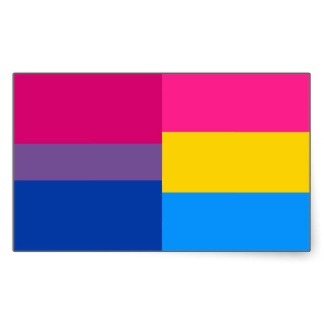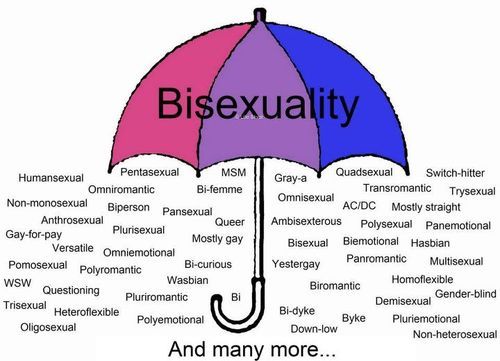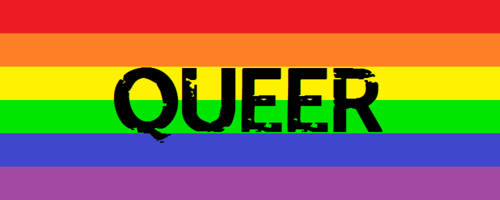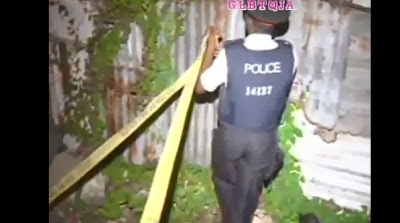
Pansexual people may choose their identity over bisexuality to emphasize an attraction to those beyond the male/female gender binary.
But does this mean that bisexuals are exclusively attracted to male born masculine men and female born feminine women? No. On the surface, bi suggests an attraction to two genders: male and female. However, the binary that bisexual refers to is same (homo) and different (hetero).
Until recently, I thought the term pansexual was a copout. I thought of it as a way people could be honest about their bisexuality without being stigmatized by a word with so much negative connotation. I saw how the pansexual movement contributed to bi erasure by suggesting that the term was obsolete, and added to the stigma of being bisexual by suggesting bisexual attraction was exclusive to trans people. And it hasn’t stopped with Pansexual. There’s polysexual, multisexual, omnisexual, ambisexual, sapiosexual, fluid, and so on. The list of non-monosexual identities get’s longer all the time.
Because of this linguistic limbo, bisexuals are accused of being inherently cis-sexist in queer circles. Any bisexual activist will tell you how frustrating these accusations are, especially those in relationships with trans and genderqueer individuals.
People feel very strongly about the word ‘bisexual’. Some people have been fighting for it their whole lives, and other people see it as a complete joke. I am one of the few men I know personally who embrace the term, and that in itself is an isolating experience.

I would like to go one step further and suggest that bisexuality is attraction to more than one identity. While bisexual is it’s own unique orientation, it does include elements of both ‘gay’ and ‘straight’. It attempts to serve as an umbrella term for all identities that are neither gay or straight, and by that very nature it is not exclusive to any single one identity.
I recently met a wonderful pansexual identified girl. We got into the most extensive debate about bi vs pan I have ever had. I told her that what I disliked most about the word ‘pansexual’ was having to explain what it is to people who had never heard the term before. She told me that it was her favorite part! If she tells someone that she’s pansexual and they ask what that it means, that’s her invitation to educate people about the complexities of gender and sexuality. It was humbling to recognize that this was something I disliked about my own identity. Often when I tell people I am bisexual, the conversation ends right then and there. After explaining to her in great detail why I resonate with the term bisexual, she asked me “So, do you identify as queer?”
And that’s when it hit me. Even pansexual people see bisexuals as some watered down version of queer. Part queer or half queer or temporarily queer.
Guess what? Bisexuals are as queer as it gets.
Bisexuals are not only queer to straight people, they are also queer to gay people. They are queer whether they are in a same sex relationship or a different sex relationship. Bisexuals are queer when they are single or married or divorced or dead. Bisexuals are so queer that it may seem impossible for them to find each other outside of the internet. Bisexuals are queer, even when they spend their whole lives trying to be straight (or gay), which more than half of them do.
Somebody recently asked me what the difference between gay/lesbian and queer was. I told them that queer doesn’t stop at gay and lesbian. Queer is a term that represents everyone who’s gender and sexual variation has outcasted them. Queer is bi or pan, transgender, intersex, asexual, and so on. Queer encompasses everyone who differs from the norm.
A bisexual activist once told me that I shouldn’t identify as queer. I should identify as bisexual every time because the more I assert my bisexual identity specifically, the more it will be accepted.
I view that as separatism, and I reject it.

I am a queer bisexual. Some say that I am gay because I am a man who has sex with men, and that’s fine with me. I might be perceived as pansexual because I kissed a beautiful trans man last month and I am also OK with that. I sometimes feel genderqueer because I have both masculine and feminine attributes. I’m not sure if I believe that monogamy is right for me, so I guess that makes me poly-curious.
My point is this: If bisexuals want to be the umbrella term that we claim to be, we must embrace every identity choice, even if we think it contradicts our own. There are pansexual identified people who are in relationships with cisgendered people and there are bisexual identified people who are in relationships with trans people, and it isn’t anyones right to re-identify those people.
All non-monosexual people are part of the same community, and the fractioning of that community because of difference in identity is a travesty. The definitions of the various non-monosexual identities have more overlapping similarities than they do unreconcilable differences, and it should be celebrated that we have so many different ways of expressing our complexities.
It’s time that bi and pan people recognize that we are equally queer. And just because being queer makes us different from others, doesn’t mean that we’re all that different from each other.
Cameron Kude is a bisexual community advocate, aspiring filmmaker, and non-fiction writer. He has lived as a total cliché in Portland, Oregon since 2011. He can be reached at c.cameronkude@gmail.com




.mkv_000108708.jpg)
.mkv_000109059.jpg)
.mkv_000113988.jpg)















+(Light).jpg)











+Cartoon+on+Rowdy+Homeless+MSM.jpg)































0 comments:
Post a Comment